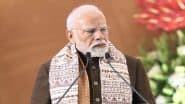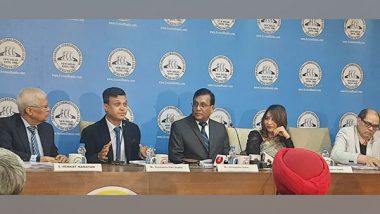New Delhi [India], December 30 (ANI): Sushanta Das Gupta, a journalist from Bangladesh and editor of Dainik Amar Habiganj on Monday raised serious concerns about the state of minorities in Bangladesh, the "growing ties between Pakistan and Bangladesh".
Gupta, who addressed a joint press conference in the national capital, said the Bangladesh government has acknowledged that there have been several incidents of violence against minorities.
"The current government in Bangladesh has admitted that 80 incidents of violence against minorities have taken place, and if nothing was happening, why would they acknowledge it?" he asked.
A press conference was held on Monday in the national capital to draw attention to the situation faced by Hindus, indigenous people, and tribal communities in Bangladesh.
The event focused on the ongoing challenges these groups face under the present government.
The press conference highlighted the "escalating religious intolerance and violence" faced by religious minorities and indigenous populations in Bangladesh.
Gupta emphasised the need of efforts to raise awareness.
"This is our second campaign, which began at the UN Minority Forum. We will continue to take further steps. It's not just Hindus who are suffering, but also minorities of other faiths, including Christians," he said.
He also expressed concern over recent developments in Bangladesh's foreign relations, particularly the growing alliance between Pakistan and Bangladesh.
"The concept of visa-free entry for Pakistanis has never existed in Bangladesh's history, yet it was introduced after August. Additionally, moves like Pakistani military personnel providing training in Bangladesh are extremely concerning," he said.
Gupta alleged that the present government is operating "outside the bounds of the nation's constitution".
US-based journalist and human rights advocate Sitangshu Guha said the Indian government should support minorities in Bangladesh, particularly Hindus, and also called for global intervention. He suggested the creation of autonomous zones in Hindu-majority regions in Bangladesh and urged India and UN members to impose sanctions on Bangladesh.
Guha described the situation "as a struggle for fundamental rights and dignity" and said the size of the Hindu population is decreasing in Bangladesh.
Pushpita Gupta, president of the Secular Bangladesh Movement, UK, claimed that religious minorities did not have adequate support in Bangladesh and temples were not being constructed.
She cited a book and talked about "the grim situation faced by Hindus" in the country. She also shared the harrowing experience of a Dhaka University student who had to flee the country just before her exams due to threats of attack and rape.
Canada-based Arun K Datta shared a personal account of the 1971 Bangladesh Liberation War, during which his family and many others suffered atrocities from Pakistani forces.
"Our homes were burned in 1971, and I was forced to live in a refugee camp in India. Every Hindu family was affected by the violence. There are no official records of the land we lost, and we are still fighting to reclaim it. There is no accurate record of how many people perished during the 1971 conflict. Even Sheikh Mujibur Rahman, the nation's leader at the time, showed no concern for our suffering....This pain has haunted us for decades, and we continue to endure the consequences of those tragic events," he said.
Speakers at the press conference sought to raise international awareness about the "human rights violations" and sought immediate action to address the situation in Bangladesh. (ANI)
(This is an unedited and auto-generated story from Syndicated News feed, LatestLY Staff may not have modified or edited the content body)













 Quickly
Quickly

















